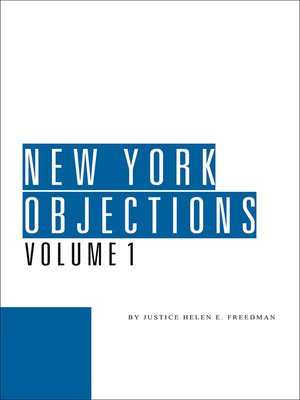
Sign up to save your library
With an OverDrive account, you can save your favorite libraries for at-a-glance information about availability. Find out more about OverDrive accounts.
Find this title in Libby, the library reading app by OverDrive.



Search for a digital library with this title
Title found at these libraries:
| Loading... |
New York Objections
Specially Designed for Courtroom Use
Winning at trial means getting your evidence in and keeping the opposition's evidence out — or at least minimizing its impact. Most evidentiary rulings are within the judge's discretion, and are made in seconds. Bad rulings are almost never reversible. In sum, victory goes to the lawyer who can prevail on the big objections in the heat of battle. The key is knowing why, when and how to object and how to respond — at a moment's notice — with supporting authority at your fingertips. That's where Justice Freedman's New York Objections comes in. Like no other resource, New York Objections uses a courtroom-friendly format to cover more than 100 trial objections with clear, concise explanations, practice tips, and cautions — plus the rules, statutes, and cases that comprise and construe New York's rules of evidence.
Pattern Objections
Model language for more than 100 objections. Use the language provided — or tailor it to fit your specific situation. You can turn to the model language you need in seconds.
Comments
Justice Freedman comments on each objection. She explains the practical application, scope, and purpose of the governing rules. And she describes the circumstances in which each objection is proper and most effective.
Practice Tips & Cautions
Justice Freedman provides ample practice tips and cautions, alerting you to common mistakes and important strategies. And the book's format makes them easy to spot.
Cases
The facts and holdings of 1500 cases (about 15 per objection) are summarized so you can quickly find supporting authority.
Response
Opposing counsel objects — and thanks to New York Objections, you have the ammunition to respond. Better yet, Justice Freedman explains how to anticipate and preclude objections before they are made. And she tells you what reactions to expect from the judge, how to meet alternative admission procedures, and more.
Foundation
New York Objections tells you how to meet the foundation requirements for specific types of evidence. You'll find instructions on how to lay your foundation and spot weaknesses in your opponent's.
Tactics
Anticipate evidence problems and plan your strategies. Justice Freedman's advice and insights give you the best chance of success. They include alternative arguments, judicial perspectives and preferences, and what you need to put on the record. Without a self-contained evidence code, New York attorneys must marshal far-flung rules, statutory provisions, and ever-developing common law. Other evidence books are full-blown academic treatises — not well-suited for handling courtroom exigencies. New York Objections bridges the gap. Organized by topic, it explains New York's evidence rules, citing all the state's relevant rules, statutes, and more than 1,500 New York cases directly on point. Don't let opposing counsel's objection block the admission of critical evidence. And don't be caught off guard when opposing counsel offers evidence you could have kept out — had you made the proper objection. Whether you're in the courtroom or preparing for trial, New York Objections will help you use the rules of evidence to their best advantage. Written by a respected New York trial judge, this book has the most comprehensive coverage of New York objections ever published. New York Objections is what you need to:






